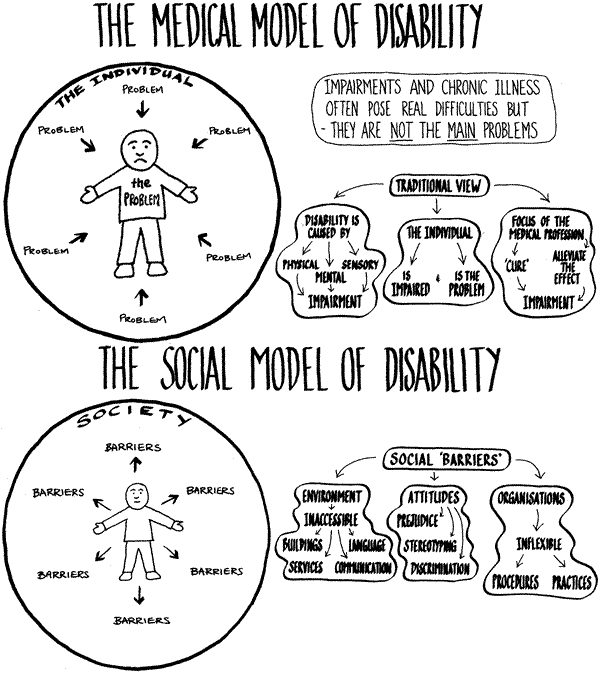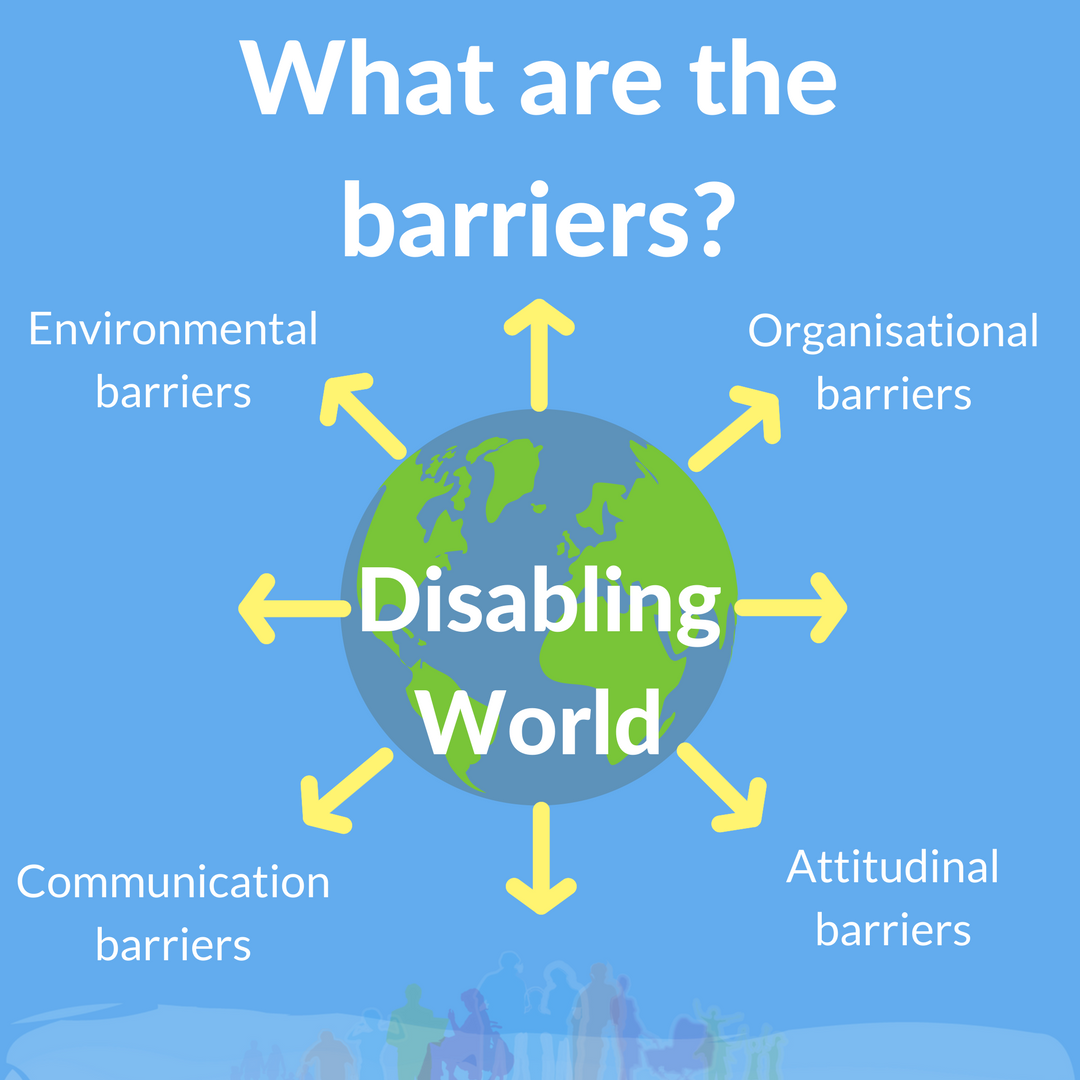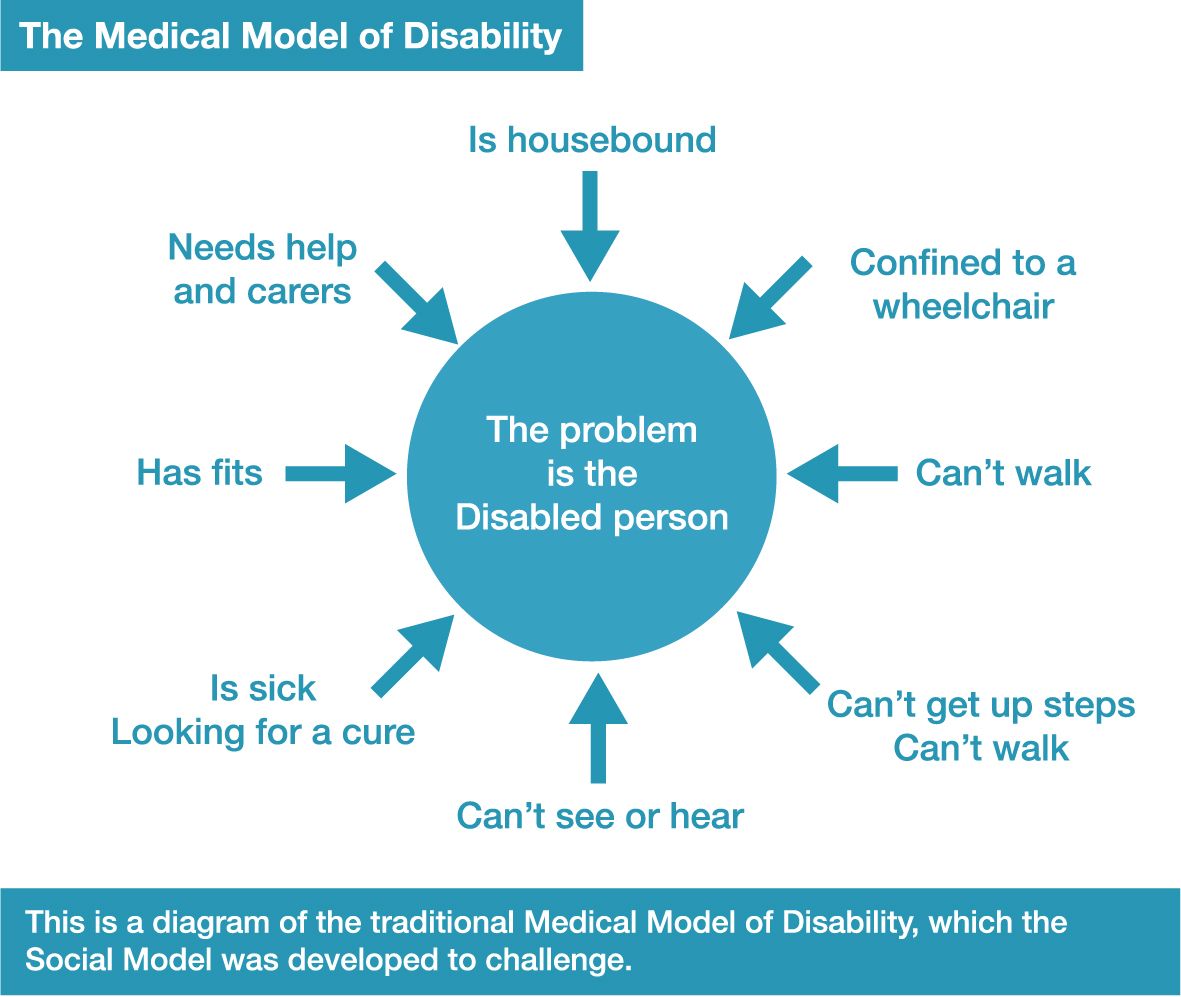|
|
The medical model uses the terms "Disability", "Disease", "Dysfunctional", "Disorder" to categorize each and every type of symptoms, differences in mechanisms, below average based on standardized measure of functioning, that causes challenges in life.
The medical model looks at what is 'wrong' with the person, not what the person needs. We believe it creates low expectations and leads to people losing independence, choice and control in their lives. - scope.org.uk The social model does not pathologize on the challenges, instead give equal attention to what the person can do. Any genetic or biological variations are just like the heterogeneity of human life. The social model of disability is a way of viewing the world, developed by disabled people. The model says that people are disabled by barriers in society, not by their impairment or difference. Barriers can be physical, like buildings not having accessible toilets. Or they can be caused by people's attitudes to difference, like assuming disabled people can't do certain things. The social model helps us recognise barriers that make life harder for disabled people. Removing these barriers creates equality and offers disabled people more independence, choice and control. - scope.org.uk The problem is, both are as real as the other, because they are both inter-dependent living as one. However, when we focus too much on deficits, the result is discrimination, prejudice, barriers to learning and unequal rights to education, work and other life choices. It is not neglecting the obvious challenges that can greatly affect a person, who might be physically or neurologically challenged. It is giving accessibility, resources, choices and recognizing that all these needs are included and embraced. As a collaborative whole community, everyone has a part to play in it. |
What does Social Model of Disability
mean to you?
|
At SCOPE, the disability equality charity in England and Wales, explains what is the social model of disability, and they provide practical advice and emotional support whenever people need them. The video shows a series of interviews discussing on what social model of Disability means.
Kiruna Stamell (Actress) in the video: Discovering the social model was a massive liberation on another level. Yeah I was being treated differently and no it wasn't me being deficient. It was everybody else's social anxieties being projected onto me. Please go to the website here, to read the transcript of the video. |
|
|
|
Imagine the frustration of people who use things designed by people who don’t take their basic needs into consideration. I think it is dehumanizing. |
|
Imagine the same scenario for a person with hidden disabilities. The stigma that comes together with the diagnosis, the environment that sets him up to fail, and the people who are constantly measuring him on a day to day basis. This can potentially create mental health troubles for any individual given the same treatment.
However most practitioners will first learn all about medical models. Most will definitely abide by the definitions as a source of reference. It is however best to use the knowledge but don't run by the deficit model with therapy or intervention approaches. There is alot more in the sub-tabs that you will gradually see, many hidden disabilities do not exist solely by themselves. Many co-morbidities overlap, and many are hidden. Which in turn, shows many strengths overlap, and many are also hidden. |
|
|
The TED video encourages the focus on strength instead of shame. In the video, Ben shows the onset of shame an individual can be subjected to, from the time there is a diagnosis. That is how medical models can affect how professionals, educators and family members continue the shower of shame for the individual.
|
How to Live, Learn and Thrive outside the Lines
by Jonathan Mooney
A great article on Mooney who encourages everyone to drop the deficit mindset.
“Every single kid has something right with them. And my challenge to you is to find it, name it, and grow it.”
“Every single kid has something right with them. And my challenge to you is to find it, name it, and grow it.”
Please DO NOT print out for DISTRIBUTION/ SALE or infringe copyrights. These are only used to share knowledge purposes.
This resource site includes inclusive services for all types of professionals. The reviews are from parents who shared their positive experiences with them. Do note that every individual is unique, and not every service provider is one size fits all. Negative feedback will not be displayed but do contact us if you feel that there are concerns, and we will decide to review for removal on a case-by-case basis. If you have come across any inclusive services that could benefit another family do contact us to place their services for other parents to find. Thank you people :D
Facebook Advocacy:
(Updated events and sharings will be also available at
www.facebook.com/ANeurodiversityRoadOfLoveSg/
This resource site includes inclusive services for all types of professionals. The reviews are from parents who shared their positive experiences with them. Do note that every individual is unique, and not every service provider is one size fits all. Negative feedback will not be displayed but do contact us if you feel that there are concerns, and we will decide to review for removal on a case-by-case basis. If you have come across any inclusive services that could benefit another family do contact us to place their services for other parents to find. Thank you people :D
Facebook Advocacy:
(Updated events and sharings will be also available at
www.facebook.com/ANeurodiversityRoadOfLoveSg/
Copyright © 2017 NEURODIVERSE INCLUSIVE CENTRAL E-NETWORK . ALL RIGHTS RESERVED


